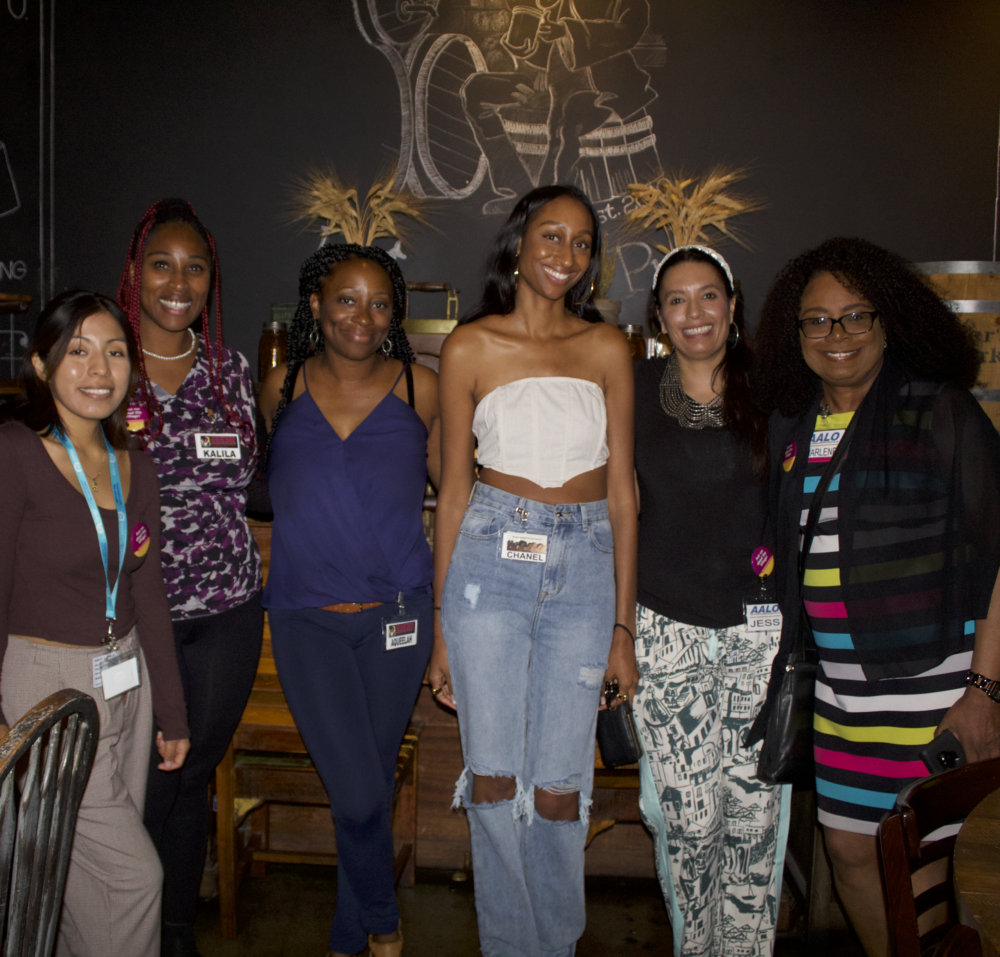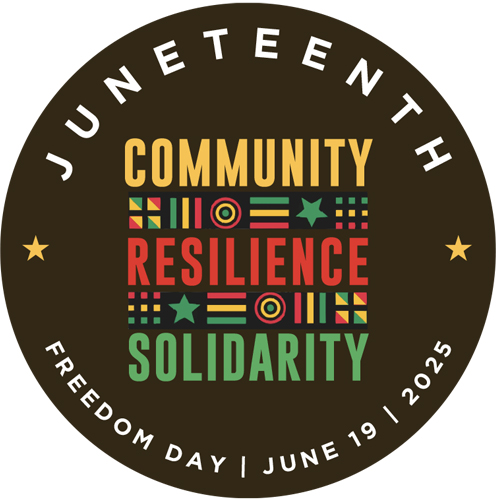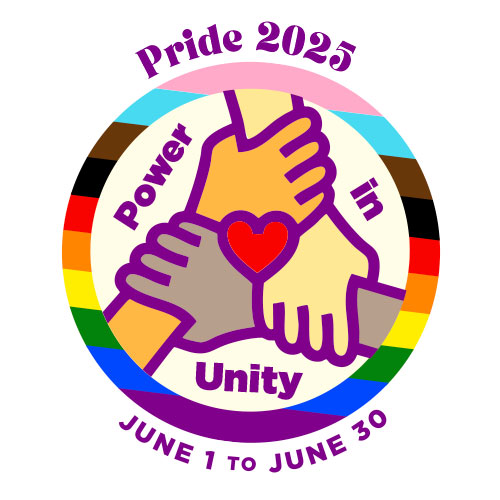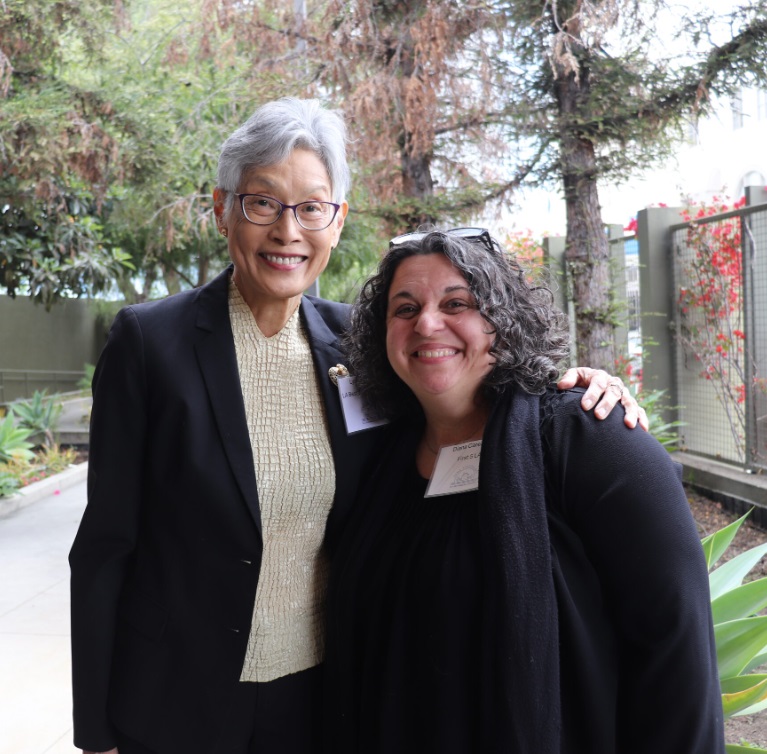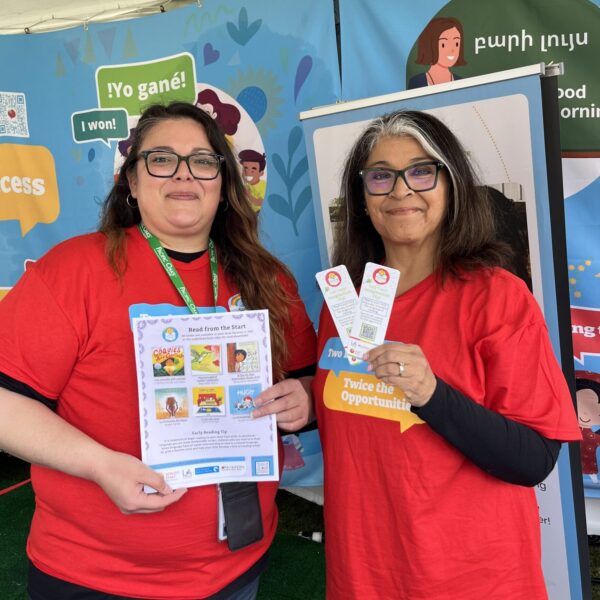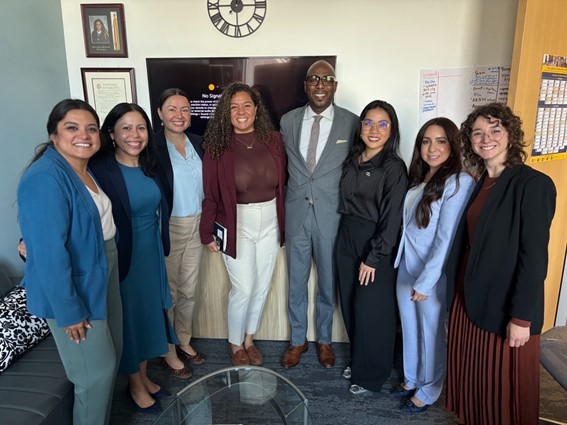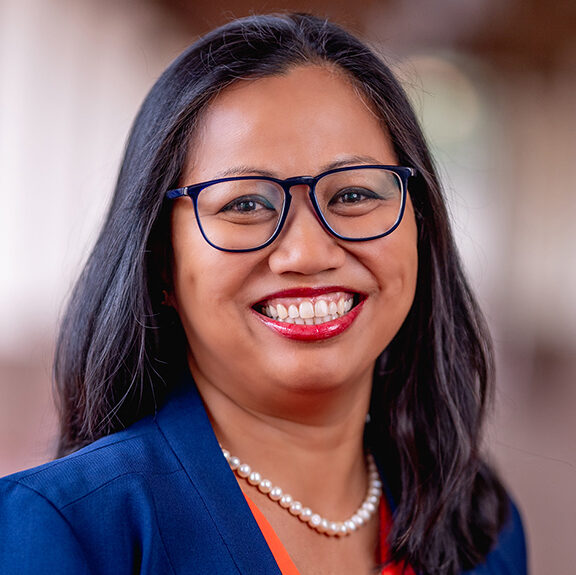By, Ruel Nolledo | Freelance Writer
September 17, 2024
How fostering connections in one of L.A.’s largest regions can help in the fight against Black infant and maternal mortality.
We got this. We got this. Whitney Shirley repeated the phrase over and over, like a mantra. Even as her contractions intensified, she managed to rise from her seat and make it to the podium. As the keynote presenter at the San Fernando & Santa Clarita Valleys Community Action Team (SFSCV CAT) year-end gathering, she had come prepared with information that she knew the audience of Black moms would find useful.
But Shirley doesn’t remember much of what happened next.
“I blacked out for the entire speech,” she confesses ruefully. “I was in so much pain, I don’t remember a thing.”
The contractions had gotten worse as Shirley, then nine months pregnant, continued her presentation. When she suddenly stopped mid-speech, the CAT planning team knew something was wrong. After quickly calling for a break, they ushered her aside and asked if she wanted to stop her presentation. Her answer came quickly.
“No,” Shirley said. “There’s one more point I need to talk about on mama authority. Just put me back on for 10 more minutes.”
***
Today, more than five months after her speech, Shirley cracks a smile as she recalls how determined she was to get through that presentation back in December.
“I wanted to be able to speak to these amazing, pregnant moms and say: Hey, I’m in your shoes as well,” she recalls. “It was very important to me because this team, this group of women, has helped me so much. I really wanted to just return the favor if I could.”
This sort of determination, notes Jessica Sullivan, executive director of the African American Leadership Organization (AALO), isn’t unusual for Shirley or the other Black moms who are banding together to build out a much-needed resource and support network by and for Black mothers in the San Fernando and Santa Clarita Valleys.
“There are no borders, no boundaries to the inequities faced by Black moms,” explains Sullivan. “So there shouldn’t be any geographical limits to the resources and services they need to overcome them. That’s what these moms and the SFSCV Community Action Team are focused on creating.”
Ensuring access to such resources for expecting and new Black moms is especially important in the San Fernando-Santa Clarita Valley region — designated as Service Provider Area 2 or SPA 2 for short — which is home to the largest percentage of live births in Los Angeles County at almost 22%. The region has a population of over 2.1 million, the largest among L.A. County’s eight SPAs. It is also, after the Antelope Valley, the largest in terms of geographic size, spanning over 1,100 square miles; for comparison’s sake, that’s the combined size of the next five largest SPAs.
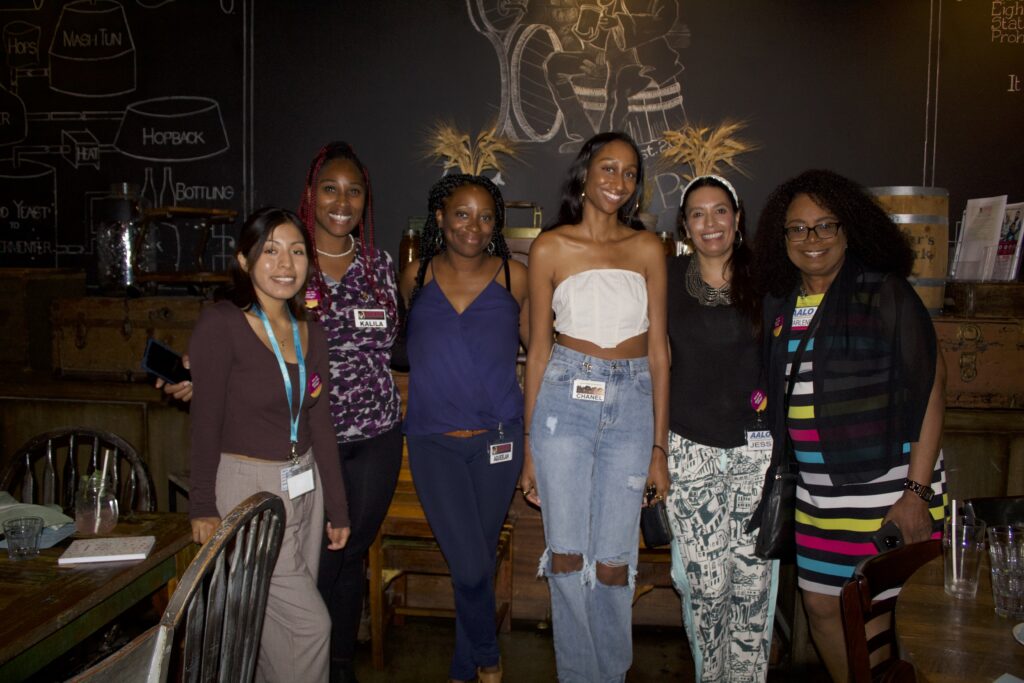
The SFSCV Community Action Team. From left to right: Edith Montes, Kalila Houston, Aqueelah Russell, Chanel Rene, Jessica Sullivan, Marlene Rowlett.
All of which makes it especially challenging to reach — and maintain connections with — Black moms. African American households comprise less than 4% of the San Fernando Valley’s population, a disproportionately small segment when compared to that of L.A. County at 7.5%. In SPA 2, there’s also no centralized hub for the African American community. Instead, Black households are dispersed throughout the roughly 40 neighborhoods and communities that make up the San Fernando-Santa Clarita Valley. Representation varies widely from one community to another as well; in Sherman Oaks, for example, Black households make up 5% of the population, while in Sunland, that figure is down to 1.4%.
L.A. County Health Program Analyst Aqueelah Russell, who serves as the County co-lead for the SFSCV Community Action Team, notes that the sheer enormity of the region makes it especially difficult to share useful resources with Black families who are at greater risk for both infant and maternal mortality.
“The entire region is so large,” stresses Russell. “From Glendale to Calabasas, it’s just really big. How do you even begin to offer services to Black families when there’s no central hub?”
It made total sense then for Russell and the Team to reach out to Black moms who were already working to activate a village of support among themselves in the region. Moms like Chanel Rene, the creator of Black Moms in the Valley (BMITV), an online group dedicated to carving out a safe space for Black moms in the region. After some initial discussions, Rene says that the team came to her with an activity planned for Black Maternal Health Week.
“It was amazing,” Rene says. “Two CAT members had joined our group by then, and I think they understood who we were and what we needed. And so the Team planned a really amazing event that was grounded in us.”
Working together, AALO, AAIMM and groups like BMITV have managed to create something special: A close-knit community that transcends distance, provides encouragement and support and promotes a sense of belonging among moms, no matter where they live in the region. Creating and supporting these kinds of communities is a key strategy that promotes AAIMM’s goal of ending Black maternal and infant mortality in Los Angeles.
The work begins with creating and maintaining a safe and regularly occurring space that is easily accessible for busy moms. Planning team members have been working with Rene and others to schedule regular CAT meetings online to make sure everyone can easily attend, as well as special events, both online and in person. This creates plenty of opportunities for moms to share their experiences, comfort each other, offer advice, and more.
These gatherings give Black moms the opportunity to simply be in a mom village of their own — a benefit that can’t be understated. Providing a space just for Black moms helps reduce exposure to the emotional stressors that come with being the only Black person in any given setting, including many new mom groups. Black birthing women are particularly vulnerable to chronic and acute stress due to daily exposure to racism at systemic and interpersonal levels. The continued exposure to such experiences causes stress on mothers’ bodies, increasing the risk of dangerous birth outcomes for moms and babies, including mortality.
“There’s this sense of: Let’s celebrate where we are,” Rene says of the CAT gatherings. “Now we have this village of sorts where we can share information with one another, where we can speak to each other in a private space and not be judged.”
Russell agrees, noting how the gatherings are much more than a series of simple meetings.
“It’s not just a network,” she observes. “It’s a sisterhood.”
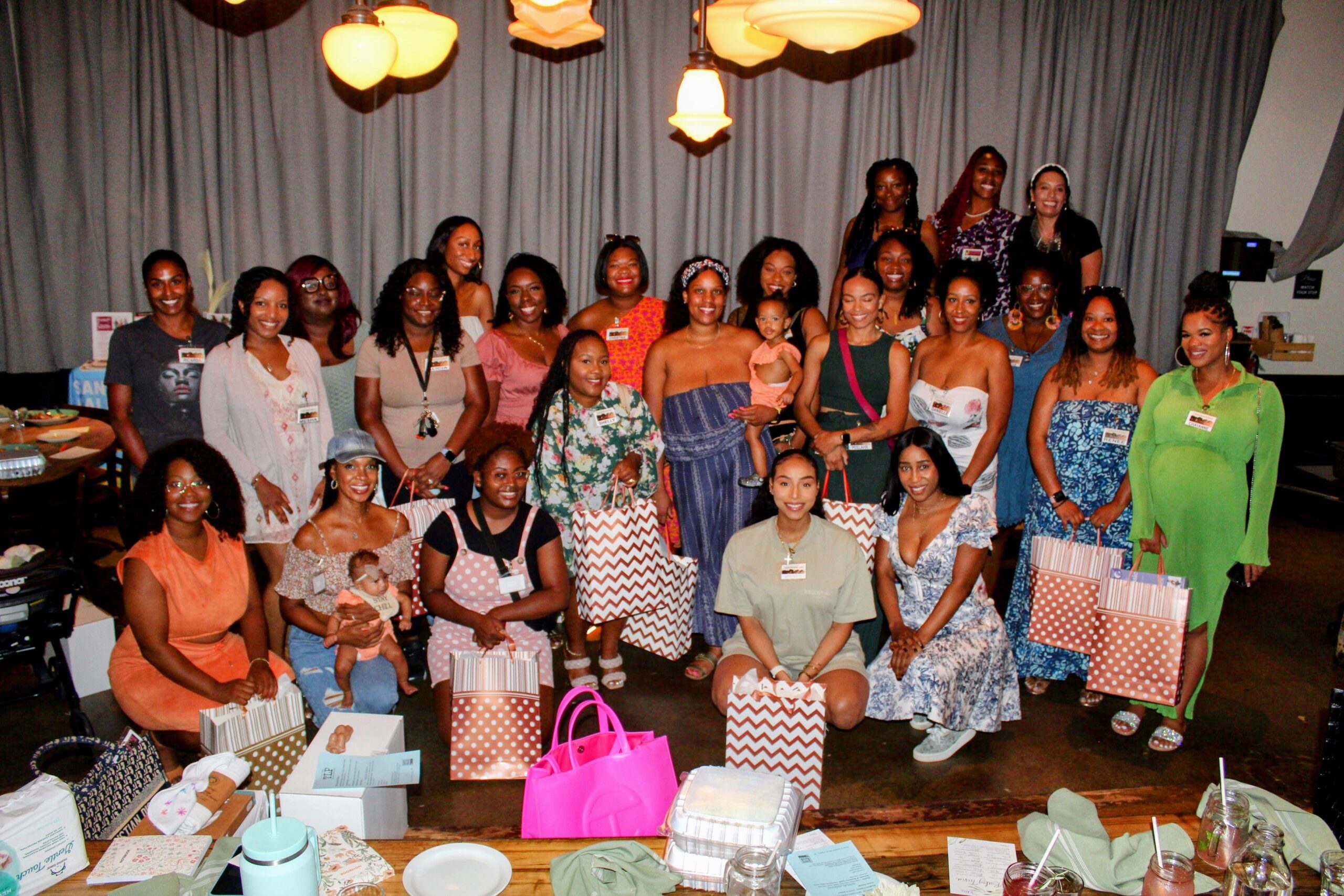
Celebrating moms with a Baby Shower Brunch during Black Breastfeeding Week.
***
In addition to being a safe, shared space for Black moms, the CAT gatherings also offer a valuable opportunity for AAIMM to share with new and expecting moms a host of resources that can make a crucial difference during an important — yet often stressful — time in their lives. Precious, a single mother of six, describes how she first learned of AAIMM’s work during the holiday season last year when she was expecting her sixth child.
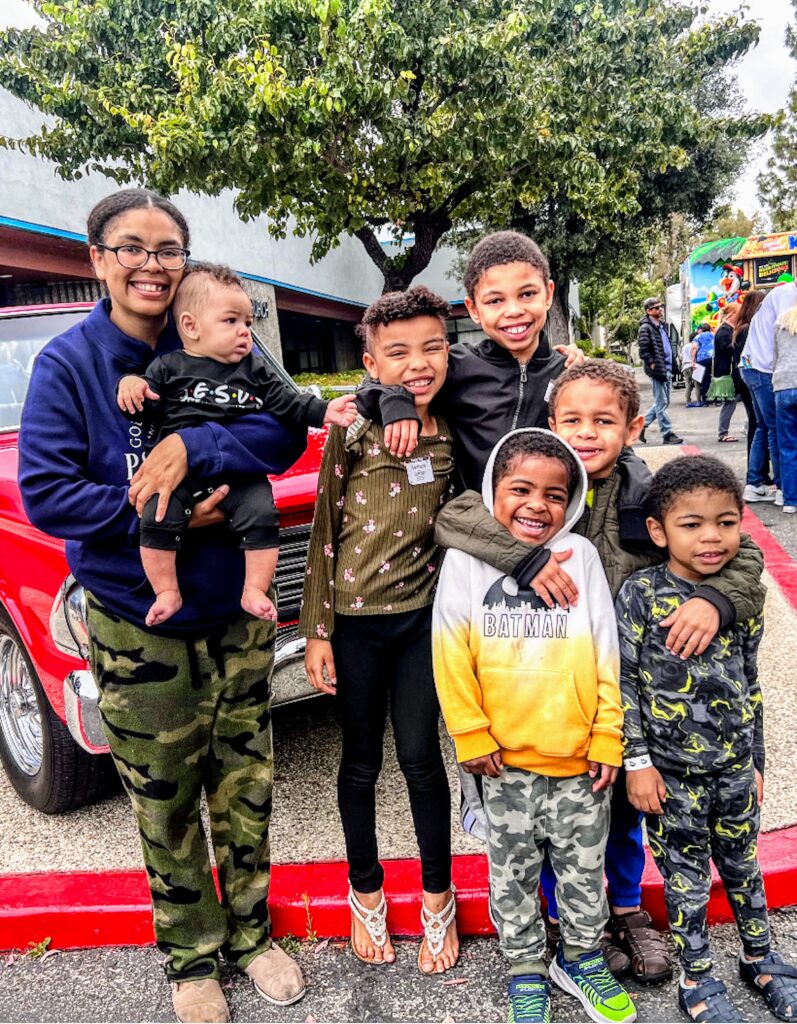
Precious and her children were able to secure resources through the work of the CAT.
“They stepped in when I had very little support,” she explains. “They made sure I had the help I needed when I was in the hospital, and then made sure I had a breast pump and other supplies after I gave birth.”
It didn’t stop there. As part of their Adopt-A-Family initiative, the team also checked in with Precious to see what else she might need at home. Through Delete the Divide, they were able to secure a repurposed laptop that could help Precious access online resources as well as new clothes for her children. Each child also received a present, just in time for the holiday season.
“We didn’t have Christmas,” Precious recounts. “And they gave us Christmas in our home.”
AAIMM’s ability to provide essential resources and information to moms serves as a perfect complement to the ability of groups like BMITV to engage mothers throughout SPA 2. The partnership is especially gratifying for Rene, who has been working to ensure BMITV members had greater access to what they and their families needed.
“I wanted us to have resources,” Rene shares. “I wanted to have things available to our group and to our kids, like car seats, breastfeeding resources and mental health supports. The CAT planning team was just so collaborative and understanding of what our group members needed and what they were looking for.”
CAT Community Co-Lead Kalila Houston notes that the team is working to make health care referral information more readily available. “We’re in the process of building up a database that lists doctors, nurses, doulas,” she says. “So whenever a mom says: ‘Hey, can you help me find someone?’ we can easily reach into our database with the right kind of information.”
Having access to crucial information about pregnancy and childbirth — and the space to discuss and evaluate it with other Black moms — is especially useful, explains Shirley, who recalls one CAT talk about lactation that dispelled so many pre-conceived myths she’d learned.
“I’m so happy I went to that event early on in my pregnancy,” she says. “It changed how I approached being a pregnant woman. It changed everything.”
***
While the resources and information provided are important, Sullivan notes that the CAT gatherings have also become a focal point for empowerment as new mothers gain the knowledge and support to take charge and advocate for themselves and their children.
“The idea of personal advocacy has definitely become embedded in conversations,” Sullivan observes. “Especially when moms share stories about their experiences in health care settings. They ask each other: ‘What do you do when a nurse dismisses your concerns? What do you do when the doctor refuses to test me for this condition or that?'”
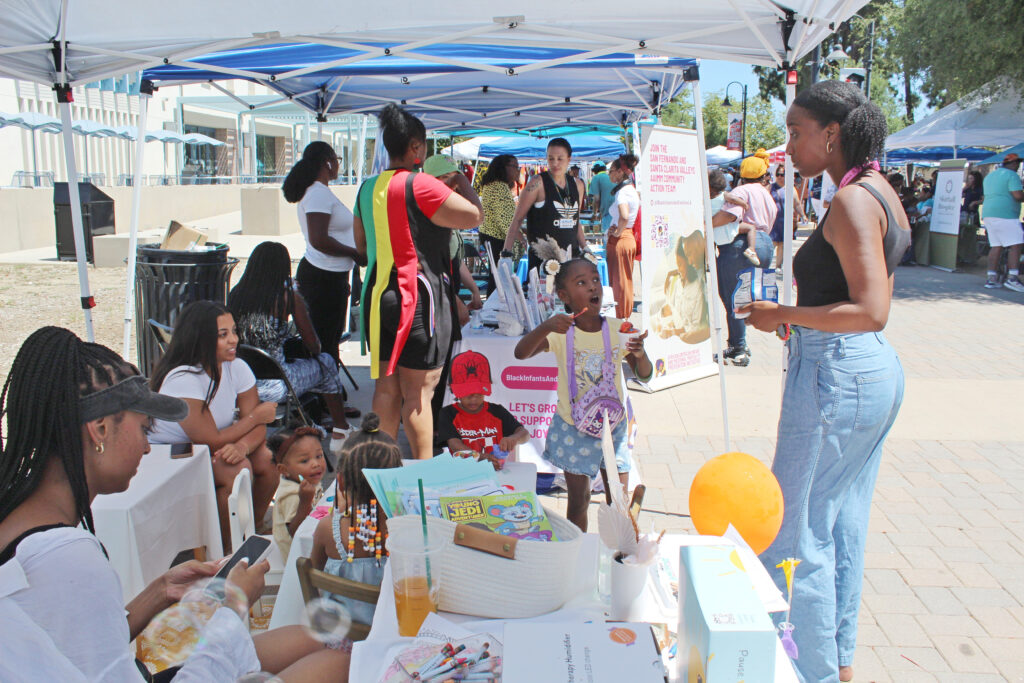
Conducting outreach at a local event.
To meet this growing need for personal advocacy, the SF/SCV CAT has been working to make sure mothers have the right resources. Sullivan describes how one mom shared with the group that her son was experiencing racism at school. “She had tried to address the problem in different ways,” Sullivan says, “but nothing was working.”
The CAT planning team connected the mom with another CAT member, Dr. Lynette Lively Cookson, who was able to guide her on how best to advocate for her child in a school setting. When other members expressed interest in advocating for their children as well, the CAT planning team worked with Dr. Lively Cookson to host “The ABCs of Black Student Empowerment,” an online event that explored various topics, including fostering advocacy, building self-confidence, and creating supportive networks.
“This is why AAIMM community action teams matter,” Sullivan states. “They build meaningful connections, the kind that really matters. They can make all the difference for a mom and her children.”
***
The most exciting work is still to come. The team is already laying the groundwork for a potential project that would help reduce infant mortality in SPA 2 by getting local hospitals engaged. That’s something long overdue, says Rene.
“Right now, we’re having discussions with moms about where they’ve delivered and what kind of birthing experience they had there,” she explains. “From there, the CAT will know who they need to have conversations with so that we’re improving how Black moms are being treated at the hospital level.”
Houston, meanwhile, is excited about making contact with more Black moms throughout SPA 2. “We plan on establishing outreach teams to connect with moms at different venues throughout the region,” she explains, adding that one particular priority would be reaching out to the church community. “They’re the foundation of the African American community. So we hope to have a team that will build relationships with local churches and say: ‘Hey, we’re here. Can we post this flyer? Can we come do a short presentation during service to let folks know we’re available to help? This is our address. You can come to us.'”
For her part, Russell is looking forward to seeing more engagement among health care providers, along with an increase in collaborative programming — lactation services, doulas and more — made available as a way of growing and expanding the village throughout SPA 2. And not just as a one-and-done activity.
“Being a mother is not a one-time thing,” Russell notes. “So how we support them shouldn’t be either. You can’t just show up, offer some help and then leave. You have to show up every day. It’s that ongoing support and partnership — that overarching care and connection — that makes a difference.”
That idea of ongoing support for Black moms resonates with Rene, who says it gets to the heart of why she was so keen on finishing her presentation back in December, no matter how painful the contractions.
“These women are my village,” she says simply. “We have to make sure they have what they need to make it through healthy and alive.”
# # #
This is the third story in Building the Village, a special 4-part series highlighting the important work taking place throughout L.A. County to combat the disproportionately high rates of Black maternal and infant deaths and ensure that all Black families experience joyous and healthy births. Created and supported by L.A. County’s African American Infant and Maternal Mortality (AAIMM) Prevention Initiative, local partnerships known as Community Action Teams (CATs) are bringing communities together to raise awareness of the crisis and identify the solutions that work best for their community.
Each CAT includes local residents (including mothers/birthing persons and dads/partners), community-based organizations, faith-based organizations, health care providers and plans/networks, birth workers such as doulas and midwives, the L.A. Department of Public Health, the L.A. County Department of Mental Health, First 5 LA, local businesses, and other allies.
Check out the previous stories in the series:
